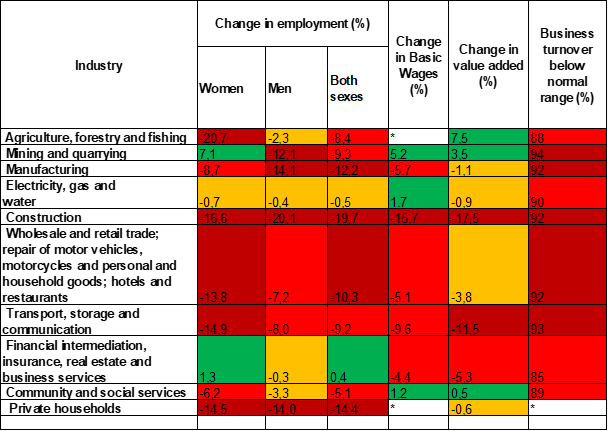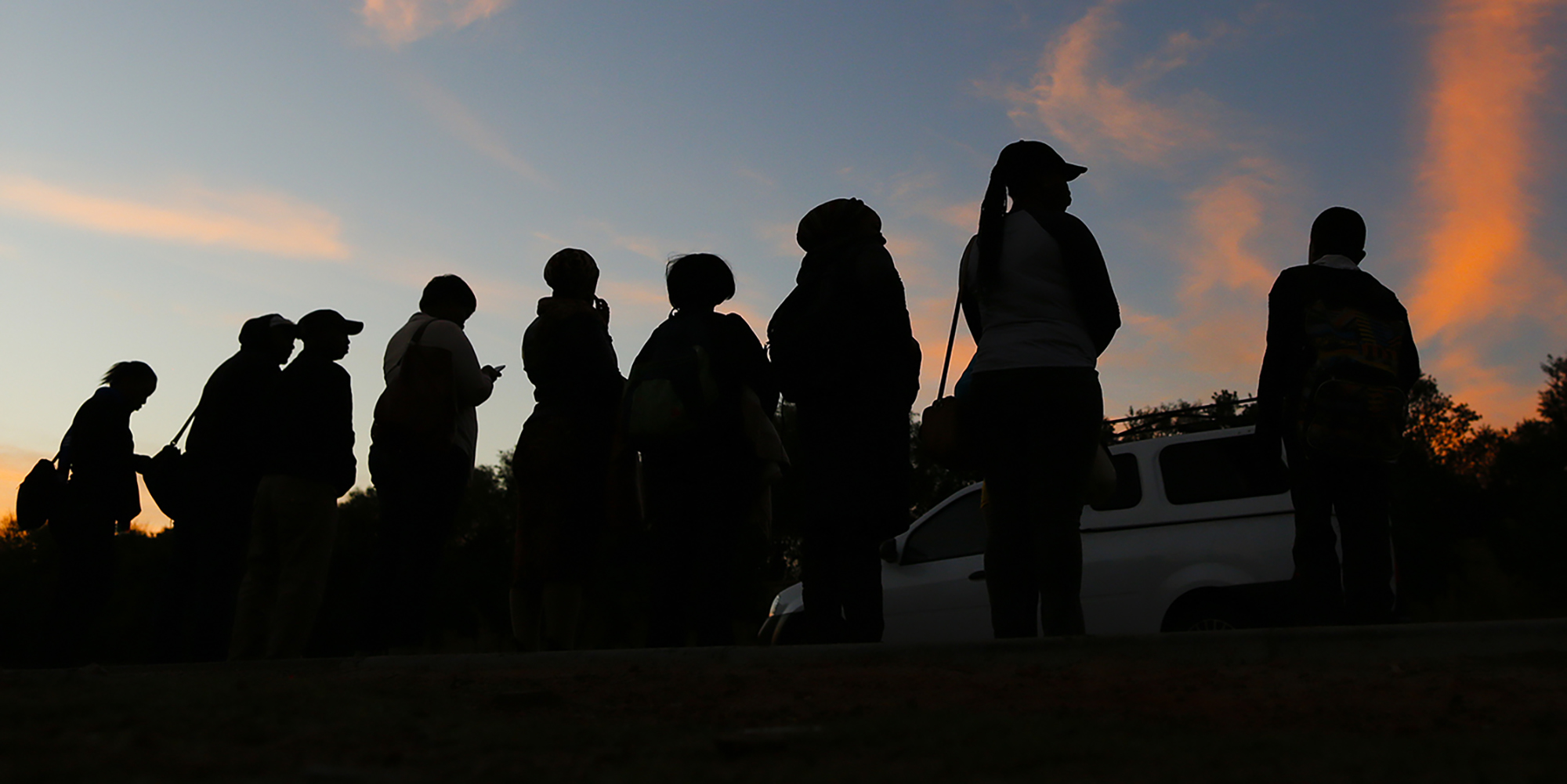Busi Sibeko, Katrina Lehmann-Grube and Zimbali Mncube are researchers at the Institute for Economic Justice.
On 28 June 2021, the South African government moved the country to alert Level 4 — a move to curb the spread of Covid-19 infections which have risen to consistently more than 10,000 a day. This comes at a time when most of the country’s pandemic-related socio-economic relief measures have been terminated.
Vulnerable sectors continue to shed jobs, business turnover has decreased and liquidations have increased. Incomes are declining, worsening hunger and food insecurity for many households.
A recently published policy brief by the Institute for Economic Justice (IEJ) highlights the differentiated impact of the pandemic and the vulnerabilities it has exacerbated for workers, businesses, women and children. The brief substantiates the need for continued urgent, targeted economic relief measures to be extended to workers, households, businesses and vulnerable sectors to ameliorate the loss of income and protect lives and livelihoods.
Businesses and hard-hit sectors
The impact of the Covid-19 lockdowns was felt immediately, with 28% of surveyed businesses reporting decreased working hours and 19% laying off staff within the first two months of Level 5 and 4 of the lockdown.
Despite this, many businesses have not survived. There was a 55% increase in the number of liquidations in the first four months of 2021, compared to the same period last year.
Such business failure is partly due to the inadequacies of existing relief measures, such as the Loan Guarantee Scheme (LGS), which have seen slow uptake by businesses. This has been attributed to the complex and stringent application procedures, which excluded many businesses, and a reluctance by owners to go further into debt.
The most vulnerable sectors have been construction, manufacturing, wholesale, retail trade and hospitality and transport, storage and communication. The vulnerability of these sectors is due to pre-existing factors and lockdown restrictions. Occupations such as domestic workers, sales and services, craft and related workers and skilled agriculture and fishery workers have seen the highest job losses in the first quarter of 2021 (Q1:2021), compared to Q1:2020.
The table below uses colour codes to show the levels of vulnerability across different variables between Q1:2020 and Q1:2021. The changes are colour-coded according to the level of vulnerability. Dark red represents a critical level, light red represents a high level of vulnerability, yellow indicates a medium level and green, a low level.
Year-on-year changes (Q1:2020 and Q1:2021) in employment, basic wages and value added, by industry.
 Source: Authors’ calculations using data from StatsSA (QLFS, Q1:2021, Q1:2020, GDP 2021 and QES Q1:2021)
Source: Authors’ calculations using data from StatsSA (QLFS, Q1:2021, Q1:2020, GDP 2021 and QES Q1:2021)
We should be worried that a stricter lockdown has been reinstated without ensuring that workers and businesses within affected sectors will receive relief measures. Based on current restrictions, workers within the hospitality sector, restaurants and entertainment-related occupations will bear the brunt of job and income losses in the third wave.
Unemployment and loss of working hours
South Africa’s unemployment crisis will worsen without urgent economic interventions for workers. In Q1:2021, the unemployment rate had increased to 43.2% by the expanded definition, and the economy supported 1.4 million fewer jobs than the same period in 2020.
Some of the hardest-hit workers are those in the informal sector, uncontracted workers and those without unemployment insurance. This shows that workers who entered the crisis more vulnerable, with few protections and less job security, have been the most affected.
The informal sector has shed almost a million jobs, with women (20.5%) slightly more impacted than men (19%). Workers without contracts saw a 32% fall in employment compared to just 2.6% for workers with contracts. Men have been affected more in this regard.
Further, more workers not registered with the Unemployment Insurance Fund (UIF) have lost more jobs than those registered — 11.9% compared to 5.3%.
Workers have also seen changes to their working hours. There was a significant fall in those working more than 40 hours per week (a 16% decrease in employees working more than 45 hours per week, and a 6% fall in those working 40-45 hours). Some of these workers shifted to working fewer hours (particularly, 30-39 hours per week) while many jobs were lost by those working part-time (fewer than 30 hours per week).
This has been more prevalent for women, illustrative of their overall higher levels of precarity and a shift towards increased casualisation. The decrease in working hours may reflect survival strategies undertaken by businesses to cope with the decreased turnover due to lockdown restrictions.
The loss of jobs and reduction in working hours leads to loss of income and consequently affects the buying power of individuals and households, and will lead to a decline in economic activity.
Implications for households
The impacts on workers, businesses and economic sectors have ripple effects on households and communities. The loss of jobs and income has placed massive burdens on poor households, reducing the money available to buy essential items. This, together with a spike in food prices, has resulted in an increase in hunger and food insecurity over the course of the pandemic.
The cost of the average household food basket has increased by 7.1%, or R271.90, to R4,128.23 in June 2021, while 39% of households ran out of food in February/March 2021. This has been worsened by school closures and associated reductions in school feeding schemes, which has also meant that children have experienced higher rates of hunger than before the pandemic.
Women have borne the brunt of these impacts in the home. As schools and Early Childhood Development Centres have closed, women have had to carry the additional burden of childcare throughout the day. Despite this, many have been excluded from social relief measures. In addition, the plague of gender-based violence (GBV) has increased during the pandemic, leaving women facing the double burden of Covid-19 and GBV.
Continued rescue is needed
South Africa is facing another critical turning point. The past few months have illustrated that even during periods of relative economic openness and reduced Covid-19 infections, the impacts of the pandemic have continued to have disastrous effects on workers, households, communities and businesses.
This means there can be no recovery without rescue. As the pandemic continues to rage on, it is absolutely vital that we institute new rescue measures commensurate with the scale and pace of the emergency facing us.
Internationally, countries have not only expanded and renewed existing socio-economic relief measures, but they have also become more targeted to the most vulnerable sectors. For instance, Australia has announced a new rescue package for the tourism sector and Germany has extended its “short-time work” furlough programme to support the loss of earnings until December 2021.
In South Africa, interventions need to take the form of more sector-specific programmes for hard-hit sectors.
In this context, the IEJ policy brief lays out 10 areas of policy intervention, from which the IEJ will propose a third wave relief and rescue plan next week. The 10 policy areas are:
- Supporting businesses to stay open in the short term despite loss of business activity;
- Maintaining employment through wage support and employment regulation;
- Offering greater support to workers who have lost employment;
- Extending sector-specific support plans to resuscitate sectors that have been particularly hard hit by the pandemic;
- Boosting construction-sector employment and public infrastructure;
- Increasing support for the informal sector;
- Improving care support infrastructure;
- Sustaining livelihoods through urgently extending and improving social relief measures;
- Improving support for women, children and frontline workers;
- Protecting workers’ health by democratising workplaces.
Within these critical interventions, proposals include the reinstatement and increase of the Special Relief of Distress Grant, the restructuring of existing business support programmes, and an extension and increase of the TERS programme.
Critically, such measures must be accompanied by an increased rollout of vaccines that prioritise those most vulnerable — including informal workers, workers in retail and services sectors and mine workers — alongside other frontline workers. These workers have never had the privilege of working from home, yet the vaccination programme is yet to prioritise their immunity.
Whilst lockdowns have been shown to limit the spread of Covid-19, they are not desirable in the absence of economic measures to cushion the impact on businesses, workers and households.
Without swift and comprehensive action now, any hope of an equal and inclusive recovery in the future will become increasingly difficult. The call for rescue is more urgent than ever. DM
This article is Part One of a two-part series by the Institute for Economic Justice (IEJ) on Covid-19 and the third wave. Part Two will present a Third Wave Relief and Rescue Package in light of new lockdown regulations.




